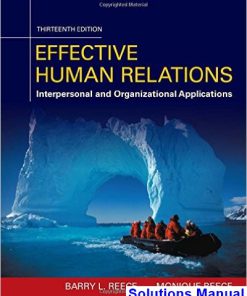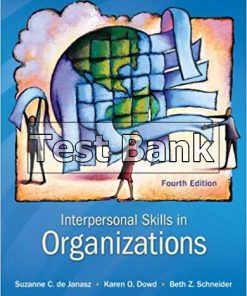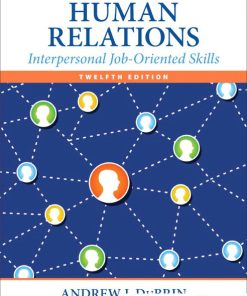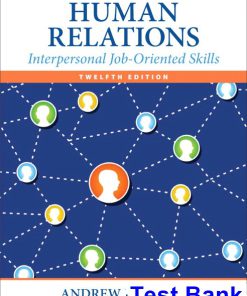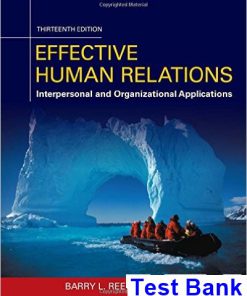Human Relations Interpersonal Job Oriented Skills Canadian 4th Edition DuBrin Test Bank
$50.00 Original price was: $50.00.$26.50Current price is: $26.50.
Human Relations Interpersonal Job Oriented Skills Canadian 4th Edition DuBrin Test Bank.
This is completed downloadable of Human Relations Interpersonal Job Oriented Skills Canadian 4th Edition DuBrin Test Bank

Product Details:
- ISBN-10 : 013310530X
- ISBN-13 : 978-0133105308
- Author: Andrew J. DuBrin, Terri Geerinck
The fourth Canadian edition of Human Relations: Interpersonal, Job-Oriented Skills by Andrew J. DuBrin and Terri Geerinck helps readers improve their personal skills in the workplace. By improving interpersonal skills, a person has a better chance of capitalizing upon his or her other skills, and two primary approaches are used in this text to achieve this lofty goal: an emphasis on the basic concepts to enhance understand of key topics in interpersonal relations in organizations, and skill-building suggestions, exercises, and cases to improve interpersonal skills through practice.
Table of Content:
- Chapter 1 A Framework for Interpersonal Skill Development
- Learning Objectives
- Learning Objective 1 Plan of the Text
- Learning Objective 2 A Model for Improving Interpersonal Skills
- Goal or Desired State of Affairs
- Fine Points about Goal Setting
- Assessing Reality
- An Action Plan
- Feedback on Actions
- Frequent Practice
- Skill-Building Exercise 1-1 Applying the Model for Improving Interpersonal Skills
- Learning Objective 3 Identification of Developmental Needs
- Learning Objective 4 Universal Needs for Improving Interpersonal Relations
- Self-Assessment Quiz 1-1 What Are Your Developmental Needs?
- Developing Interpersonal Skills on the Job
- Informal Learning
- Specific Developmental Experiences
- Developing Your Human Relations Skills and Reinforcing Concepts
- Summary
- Questions for Discussion and Review
- Multiple Choice
- Short Answer
- The Web Corner
- Chapter 2 Understanding Individual Differences
- Learning Objectives
- Learning Objective 1 Learning Objective 2 Personality
- Eight Major Personality Factors and Traits
- Self-Assessment Quiz 2-1 The Risk-Taking Scale
- The Eight Factors and Traits and Job Performance
- Extraversion and Self-Monitoring
- Organizational Citizenship Behaviour
- Turnover and Personality
- Optimism and Pessimism
- Combination of Standing on Several Personality Traits
- Cognitive Styles and Personality Types
- Learning Objective 3 Guidelines for Dealing with Different Personality Types
- Skill-Building Exercise 2-1 Personality Role-Plays
- The Extravert:
- The Open-to-Experience Type:
- The Organizational Citizen:
- Cognitive Ability
- Traditional Intelligence
- Practical Intelligence
- Multiple Intelligences
- Emotional Intelligence
- Skill-Building Exercise 2-2 Adapting to People of Different Mental Ability
- The Cognitively Skilled Co-Worker:
- The Cognitively Average Team Member:
- Learning Objective 4 Guidelines for Relating to People of Different Levels and Types of Intelligence
- Skill-Building Exercise 2-3 Helping an Intellectually Challenged Worker Get Started
- Values as a Source of Individual Differences
- Classification of Values
- Generational Differences in Values
- How Values Are Learned
- Clarifying Your Values
- Self-Assessment Quiz 2-2 Clarifying Your Values
- The Mesh between Individual and Job Values
- Learning Objective 5 Guidelines for Using Values to Improve Interpersonal Relations
- Skill-Building Exercise 2-4 The Value-Conflict Role-Play
- Developing Your Human Relations Skills and Reinforcing Concepts
- Summary
- Questions for Discussion and Review
- Multiple Choice
- Short Answer
- The Web Corner
- Chapter 3 Building Self-Esteem and Self-Confidence
- Learning Objectives
- Learning Objective 1 The Meaning of Self-Esteem, Its Development and Consequences
- Self-Assessment Quiz 3-1 The Self-Esteem Checklist
- How Self-Esteem Develops
- The Consequences of High Self-Esteem
- Career Success
- Good Mental Health
- Profiting from Feedback
- Organizational Success
- Potential Negative Consequences
- Learning Objective 2 Enhancing Self-Esteem
- Attain Legitimate Accomplishments
- Be Aware of Personal Strengths
- Skill-Building Exercise 3-1 Reinforcing a Positive Self-Image
- Rebut the Inner Critic
- Skill-Building Exercise 3-2 The Self-Esteem Building Club
- Practise Self-Nurturing
- Minimize Settings and Interactions That Detract from Your Feelings of Competence
- Get Help from Others
- Model the Behaviour of People with High Self-Esteem
- Create a High-Self-Esteem Living Space
- Skill-Building Exercise 3-3 The Self-Esteem Calendar
- How a Manager Helps Build the Self-Esteem of Group Members
- Learning Objective 3 The Importance of Self-Confidence and Self-Efficacy
- Self-Assessment Quiz 3-2 How Self-Confident Are You?
- Learning Objective 4 Techniques for Developing and Enhancing Your Self-Confidence
- Develop a Solid Knowledge Base
- Use Positive Self-Talk
- Avoid Negative Self-Talk
- Use Positive Visual Imagery
- Set High Expectations for Yourself (the Galatea Effect)
- Develop the Explanatory Style of Optimists
- Strive for Peak Performance
- Skill-Building Exercise 3-4 Building Your Self-Confidence and Self-Efficacy
- Bounce Back from Setbacks and Embarrassments
- Get Past the Emotional Turmoil
- Find a Creative Solution to Your Problem
- Developing Your Human Relations Skills and Reinforcing Concepts
- Summary
- Questions for Discussion and Review
- Multiple Choice
- Short Answer
- The Web Corner
- Chapter 4 Interpersonal Communication
- Learning Objectives
- Learning Objective 1 Steps in the Communication Process
- Learning Objective 2 Relationship Building and Interpersonal Communication
- Learning Objective 3 Nonverbal Communication in Organizations
- Modes of Transmission of Nonverbal Communication
- Environment
- Interpersonal Distance
- Posture
- Hand Gestures
- Facial Expressions and Eye Contact
- Voice Quality
- Self-Assessment Quiz 4-1 Voice-Quality Checkup
- Personal Appearance
- Attention Paid to Other Person
- Guidelines for Improving Nonverbal Communication
- Skill-Building Exercise 4-1 The Mirroring Technique
- Learning Objective 4 Guidelines for Overcoming Communication Problems and Barriers
- Understand the Receiver
- Minimize Defensive Communication
- Repeat Your Message Using Multiple Channels (in Moderation)
- Check Comprehension and Feelings through Verbal and Nonverbal Feedback
- Display a Positive Attitude
- Communicate Persuasively
- Engage in Active Listening
- Skill-Building Exercise 4-2 I Want a Raise
- Accept the Sender’s Figure of Speech
- Paraphrase and Listen Reflectively
- Minimize Distractions
- Ask Questions
- Allow the Sender to Finish His or Her Sentence
- Use Nonverbal Communication
- Minimize Words That Shut Down Discussion
- Avoid the Need to Lie or Fake When You Have Not Been Paying Attention
- Prepare for Stressful Conversations
- Self-Assessment Quiz 4-2 Listening Traps
- Skill-Building Exercise 4-3 Listening to a Co-worker
- The Elated Co-worker:
- The Discouraged Co-worker:
- Engage in Metacommunication
- Recognize Gender Differences in Communication Style
- Developing Your Human Relations Skills and Reinforcing Concepts
- Summary
- Questions for Discussion and Review
- Multiple Choice
- Short Answer
- The Web Corner
- Chapter 5 Interpersonal Skills for the Digital World
- Learning Objectives
- Self-Assessment Quiz 5-1 The Interpersonal Skills for the Digital World Checklist
- Learning Objective 1 Interpersonal Skills for One-on-One Interactions
- Cell Phones and Text Messaging
- Positive Interpersonal Skills While Using Cell Phones and Text Messaging
- Negative Interpersonal Skills While Using Cell Phones and Text Messaging
- Skill-Building Exercise 5-1 The Important Message
- Email Messages and Instant Messaging
- Webcam Job Interviews
- Interpersonal Aspects of Multitasking
- Multitasking and Positive Interpersonal Skills
- Multitasking and Negative Interpersonal Skills
- Harassment and Cyberbullying of Others
- Learning Objective 2 Learning Objective 3 Interpersonal Skills for Small and Large Audiences
- Social Networking by Internet
- Positive Interpersonal Skills and Social Networking
- Negative Interpersonal Skills and Social Networking
- Laptop and Personal Digital Assistant Use during Meetings and Other Formal Settings
- Skill-Building Exercise 5-2 Justifying Laptop Use during a Meeting
- Interpersonal Aspects of Presentation Technology
- Videoconferencing
- Self-Assessment Quiz 5-2 The Presentation Technology Checklist of Interpersonal Behaviours
- Interpersonal Skills Linked to Telecommuting
- Avoiding Damage to Your Online Reputation
- Developing Your Human Relations Skills and Reinforcing Concepts
- Summary
- Questions for Discussion and Review
- Multiple Choice
- Short Answer
- The Web Corner
- Chapter 6 Developing Teamwork Skills
- Learning Objectives
- Learning Objective 1 Face-to-Face versus Virtual Teams
- Self-Assessment Quiz 6-1 Team Player Attitudes
- Scoring and Interpretation:
- Face-to-Face (Traditional) Teams
- Self-Assessment Quiz 6-2 Team Skills
- Interpretation:
- Virtual Teams
- Learning Objective 2 Advantages and Disadvantages of Teams and Teamwork
- Advantages of Group Work and Teamwork
- Synergy
- Work Accomplishment and High Productivity
- Acceptance and Commitment
- Avoidance of Major Errors
- Increased Job Satisfaction
- Disadvantages of Group Work and Teamwork
- Time Wasting
- Pressures toward Conformity
- Shirking of Individual Responsibility (Social Loafing)
- Fostering of Conflict
- Groupthink
- Self-Assessment Quiz 6-3 The Conformity Quiz
- Interpretation:
- Skill Development:
- Learning Objective 3 Team Member Roles
- Self-Assessment Quiz 6-4 Team Player Roles
- Scoring and Interpretation:
- Learning Objective 4 Guidelines for the Interpersonal Aspects of Team Play
- Skill-Building Exercise 6-1 Team Member Roles
- Scenario A: Management Team
- Scenario B: Group of Sports Fans
- Scenario C: Community Group
- Trust Team Members
- Display a High Level of Cooperation and Collaboration
- Skill-Building Exercise 6-2 The Scavenger Hunt
- Recognize the Interests and Achievements of Others
- Give and Receive Helpful Criticism
- Share the Glory
- Take Care Not to Rain on Another Person’s Parade
- Learning Objective 5 Guidelines for the Task Aspects of Team Play
- Provide Technical Expertise (or Knowledge of the Task)
- Assume Responsibility for Problems
- See the Big Picture
- Believe in Consensus
- Focus on Deadlines
- Help Team Members Do Their Jobs Better
- Be a Good Organizational Citizen
- Skill-Building Exercise 6-3 Habitat for the Homeless
- Learning Objective 6 Developing Team Leadership Skills
- Self-Assessment Quiz 6-5 What Style of Leader Are You or Would You Be?
- Scoring and Interpretation:
- Skill Development:
- Engage in Shared Leadership
- Build a Mission Statement
- Skill-Building Exercise 6-4 Developing a Team Mission Statement
- Show Your Team Members That They Are Trusted
- Establish a Sense of Urgency and High Performance Standards
- Hold Question-and-Answer Sessions with the Team
- Encourage Team Members to Recognize Each Other’s Accomplishments
- Encourage Honest Criticism
- Skill-Building Exercise 6-5 Recognizing Team Accomplishments
- Use Peer Evaluations
- Help Team Members See the Big Picture
- Minimize Formation of In-Groups and Out-Groups
- Developing Your Human Relations Skills and Reinforcing Concepts
- Summary
- Questions for Discussion and Review
- Multiple Choice
- Short Answer
- The Web Corner
- Chapter 7 Group Problem Solving and Decision Making
- Learning Objectives
- Learning Objective 1 Rational versus Political Decision Making in Groups
- Self-Assessment Quiz 7-1 My Problem-Solving Tendencies
- Scoring and Interpretation:
- Learning Objective 2 Guidelines for Using General Problem-Solving Groups
- Working through the Group Problem-Solving Steps
- The Problem-Solving Steps
- Skill-Building Exercise 7-1 A General Problem-Solving Group
- When to Apply the Problem-Solving Steps
- The Importance of Collective Efficacy
- Skill-Building Exercise 7-2 Solving a Few Unusual Problems
- Problem 1: Seven Tennis Balls in a Tube
- Problem 2: The Too-Low Bridge
- Problem 3: The Aging Members of HOG
- Managing Disagreement about Group Decision Making
- Aiming for Inquiry versus Advocacy in Group Decision Making
- Learning Objective 3 Guidelines for Brainstorming
- Skill-Building Exercise 7-3 Stretch Your Imagination
- Skill-Building Exercise 7-4 Brainstorming versus Brainwriting
- Learning Objective 4 Guidelines for the Nominal Group Technique
- Skill-Building Exercise 7-5 The Nominal Group Technique
- Learning Objective 5 Using Standup Meetings to Facilitate Problem Solving
- Using Email and Groupware to Facilitate Group Decision Making
- Using Email to Facilitate Meetings
- Using Groupware to Facilitate Group Problem Solving
- Learning Objective 6 Suggestions for Being an Effective Meeting Participant
- Developing Your Human Relations Skills and Reinforcing Concepts
- Summary
- Questions for Discussion and Review
- Multiple Choice
- Short Answer
- The Web Corner
- Chapter 8 Cross-Cultural Relations and Diversity
- Learning Objectives
- Learning Objective 1 The Diversity Umbrella
- Self-Assessment Quiz 8-1 Cross-Cultural Skills and Attitudes
- Interpretation:
- Learning Objective 2 Understanding Cultural Differences
- Cultural Sensitivity and Political Correctness
- Cultural Intelligence
- Respect for All Workers and Cultures
- Cultural Fluency
- Dimensions of Differences in Cultural Values
- Skill-Building Exercise 8-1 Developing Cultural Sensitivity
- Self-Assessment Quiz 8-2 Charting Your Cultural Dimension Profile
- Scoring and Interpretation:
- Cultural Bloopers
- Learning Objective 3 Overcoming Cross-Cultural Barriers
- Skill-Building Exercise 8-2 Cultural Mistakes to Avoid with Selected Cultural Groups
- Learning Objective 4 Techniques for Improving Cross-Cultural Relations
- Skill-Building Exercise 8-3 Cross-Cultural Relations Role-Play
- Cultural Training
- Cultural Intelligence Training
- Language Training
- Diversity Training
- Forms of Diversity Training
- Skill-Building Exercise 8-4 Using the Internet to Help Develop Foreign-Language Skills
- Concerns about Diversity Training
- Cross-Cultural and Cross-Gender Mentoring Programs
- Skill-Building Exercise 8-5 Developing Empathy for Differences
- Developing Your Human Relations Skills and Reinforcing Concepts
- Summary
- Questions for Discussion and Review
- Multiple Choice
- Short Answer
- The Web Corner
- Chapter 9 Resolving Conflicts with Others
- Learning Objectives
- Learning Objective 1 Sources of Interpersonal Conflict in Organizations
- Learning Objective 2 Self-Assessment Quiz 9-1 Collaborative versus Competitive Styles of Conflict Management
- Scoring and Interpretation:
- Competition for Limited Resources
- Role Conflict
- Competing Work and Family Demands
- Work-to-Family and Family-to-Work Conflict
- The Issue of Work–Life Choices
- Company Initiatives to Reduce Work–Family Conflict
- Personality Clashes
- Bullies in the Workplace
- Incivility and Rudeness
- Cross-Generational Conflict
- Workplace Violence (A Cause and Effect of Conflict)
- Learning Objective 3 Conflict Management Styles
- Competitive Style
- Accommodative Style
- Sharing Style
- Collaborative Style
- Avoidant Style
- Skill-Building Exercise 9-1 Win–Win Conflict Resolution
- Learning Objective 4 Guidelines and Techniques for Resolving Conflicts
- Confrontation and Problem Solving
- Constructive Handling of Criticism
- Reframing
- Reframing through Cognitive Restructuring
- Skill-Building Exercise 9-2 Disarming the Opposition
- Skill-Building Exercise 9-3 Reframing through Cognitive Restructuring
- Reframing by Asking Questions
- Negotiating and Bargaining
- Understand the Other Party’s Perspective
- Self-Assessment Quiz 9-2 The Negotiator Quiz
- Scoring and Interpretation:
- Focus on Interests, Not Positions
- Compromise
- Begin with a Plausible Demand or Offer, Yet Allow Room for Negotiation
- Make Small Concessions Gradually
- Know Your Best Alternative to a Negotiated Agreement (BATNA)
- Use Anger to Your Advantage
- Allow for Face-Saving
- Learning Objective 5 Combatting Sexual Harassment: A Special Type of Conflict
- Skill-Building Exercise 9-4 Negotiating a Starting Salary
- The Adverse Effects of Sexual Harassment
- Guidelines for Preventing and Dealing with Sexual Harassment
- Skill-Building Exercise 9-5 Combating Sexual Harassment
- Scenario 1: The Offensive Jester
- Scenario 2: The Flirtatious Office Manager
- Developing Your Human Relations Skills and Reinforcing Concepts
- Summary
- Questions for Discussion and Review
- Multiple Choice
- Short Answer
- The Web Corner
- Chapter 10 Becoming an Effective Leader
- Learning Objectives
- Learning Objective 1 Key Leadership Traits to Develop
- Self-Confidence and Leadership Efficacy
- Positive Core Self-Evaluation
- Assertiveness
- Trustworthiness and Morality
- Self-Assessment Quiz 10-1 The Assertiveness Scale
- Scoring Key
- Interpretation:
- Sense of Humour
- Skill-Building Exercise 10-1 The Witty Leader
- Self-Awareness and Self-Objectivity
- Cognitive Skills Including Critical Assessments
- Knowledge of the Business
- Critical Assessments
- Independent Decision Making
- Emotional Intelligence
- Passion and Enthusiasm
- Self-Sacrificing Personality
- Learning Objective 2 Suggestions for Developing Charisma
- Skill-Building Exercise 10-2 Creating a Vision
- Learning Objective 3 Coaching and Training Others
- Coaching Skills and Techniques
- Ideal Characteristics of Peer Coaching
- Suggestions for Coaching
- Self-Assessment Quiz 10-2 Characteristics of an Effective Coach
- Training Others
- Skill-Building Exercise 10-3 Coaching a Mediocre Performer Role-Play
- Skill-Building Exercise 10-4 Designing a Training Program
- Learning Objective 4 Developing Your Leadership Potential
- Skill-Building Exercise 10-5 My Personal Leadership Journal
- Developing Your Human Relations Skills and Reinforcing Concepts
- Summary
- Questions for Discussion and Review
- Multiple Choice
- Short Answer
- The Web Corner
- Chapter 11 Skills for Motivating and Helping Others
- Learning Objectives
- Learning Objective 1 Motivation Skill Based on the Principle of “What’s in It for Me?”
- Self-Assessment Quiz 11-1 My Approach to Motivating Others
- Instructions:
- Scoring and Interpretation:
- Learning Objective 2 Using Positive Reinforcement to Motivate Others
- Rule 1: State Clearly What Behaviour Will Lead to a Reward
- Rule 2: Choose an Appropriate Reward
- Rule 3: Supply Ample Feedback
- Rule 4: Schedule Rewards Intermittently
- Rule 5: Make Sure the Rewards Follow the Observed Behaviour Closely in Time
- Rule 6: Make the Reward Fit the Behaviour
- Rule 7: Make the Reward Visible
- Skill-Building Exercise 11-2 Positive Reinforcement
- Scenario 1: Rewarding a Customer Service Representative
- Scenario 2: Rewarding Your Boss
- Rule 8: Change the Reward Periodically
- Learning Objective 3 Using Recognition to Motivate Others
- Why Recognition Is a Strong Motivator
- Approaches to Giving Recognition
- Fine Points about Using Recognition to Motivate Others
- Learning Objective 4 Using Expectancy Theory to Motivate Others
- Capsule Overview of Expectancy Theory
- Basic Components of Expectancy Theory
- How Moods Influence Expectancy Theory
- Skill-Building Exercise 11-3 Estimating Valences for Applying Expectancy Theory
- Diagnosing Motivation with Expectancy Theory
- Guidelines for Applying Expectancy Theory
- Skill-Building Exercise 11-4 Applying Expectancy Theory
- Learning Objective 5 Motivating Others by Nurturing and Mentoring
- Being a Nurturing, Positive Person
- Self-Assessment Quiz 11-2 Attitudes Toward Helping Others
- Scoring and Interpretation:
- Being a Mentor to Co-Workers
- Skill-Building Exercise 11-5 The Nurturing, Positive Person
- Characteristics and Types of Mentoring
- Specific Mentoring Behaviours
- Skill-Building Exercise 11-6 Selecting a Protégé
- My Ideal Protégé
- Helping Difficult People
- Types of Difficult People
- Self-Assessment Quiz 11-3 Helping Difficult People
- Scoring and Interpretation:
- Tactics for Dealing with Difficult People
- Stay Calm
- Provide Ample Feedback
- Criticize Constructively
- Help the Difficult Person Feel More Confident
- Use Tact and Diplomacy
- Use Non-hostile Humour
- Work Out a Deal
- Reinforce Civil Behaviour and Good Moods
- Ask the Difficult Person to THINK Before Speaking
- Report Behaviour That Continues to Be Unacceptable or Inappropriate
- Skill-Building Exercise 11-7 Dealing with Difficult People
- Scenario 1: The Bully
- Scenario 2: A No-Person
- Developing Your Human Relations Skills and Reinforcing Concepts
- Summary
- Questions for Discussion and Review
- Multiple Choice
- Short Answer
- The Web Corner
- Chapter 12 Positive Political Skills
- Learning Objectives
- Self-Assessment Quiz 12-1 Organizational Politics Questionnaire
- Scoring and Interpretation:
- Learning Objective 1 Political Skill and Other Human Relations Skills
- Sensitivity to Your Surroundings
- Emotional Intelligence and Social Intelligence
- Relationship Building with the Leader
- Overcoming the Effects of Injustice
- Learning Objective 2 Impression Management and Etiquette
- Tactics of Impression Management
- Display Organizational Citizenship Behaviour
- Build Trust and Confidence
- Be Visible and Create a Strong Presence
- Admit Mistakes
- Minimize Being a Yes-Person
- Create a Healthy Image
- Skill-Building Exercise 12-1 The Elevator 30-Second Speech
- Business Etiquette
- Etiquette for Work Behaviour, Including Clothing
- Introductions
- Relationships between Men and Women and between People of Different Ages
- Dining
- Working in a Cubicle
- Cross-Cultural Relations
- Interacting with People with Disabilities
- Skill-Building Exercise 12-2 Business Etiquette
- Scenario 1: Dining Etiquette
- Scenario 2: Etiquette for Communicating with a Person in a Wheelchair
- Learning Objective 3 Building Relationships with Managers and Other Key People
- Network with Influential People
- Help Your Manager Succeed
- Understand Unwritten Boundaries
- Volunteer for Assignments
- Flatter Influential People Sensibly
- Use Information Power
- Skill-Building Exercise 12-3 Flattering an Influential Person
- Appear Cool under Pressure
- Laugh at Your Manager’s Humour
- Express Constructive Disagreement
- Present a Clear Picture of Your Accomplishments
- Learning Objective 4 Building Relationships with Co-workers and Other Work Associates
- Maintain Honest and Open Relationships
- Make Others Feel Important
- Be Diplomatic
- Self-Assessment Quiz 12-2 How Important Do I Make People Feel?
- Scoring and Interpretation:
- Exchange Favours
- Ask Advice
- Share Constructive Gossip
- Minimize Microinequities
- Follow Group Norms
- Skill-Building Exercise 12-4 Getting Along with Co-workers Role-Play
- Scenario 1: Exchanging Favours
- Scenario 2: Express an Interest in the Co-worker’s Work
- Learning Objective 5 Avoiding Political Blunders
- Self-Assessment Quiz 12-3 The Blunder Quiz
- Scoring and Interpretation:
- Developing Your Human RelationsSkills and Reinforcing Concepts
- Summary
- Questions for Discussion and Review
- Multiple Choice
- Short Answer
- The Web Corner
- Chapter 13 Customer Satisfaction Skills
- Learning Objectives
- Self-Assessment Quiz 13-1 The Customer-Service Orientation Quiz
- Scoring and Interpretation:
- Learning Objective 1 The Three Components of Customer Experience (Service)
- Learning Objective 2 Following the General Principles of Customer Satisfaction
- Be Satisfied So You Can Provide Better Customer Service
- Receive Emotional Support from Co-workers to Give Better Customer Service
- Understand Customer Needs and Put Them First
- Focus on Solving Problems, Not Just Taking Orders
- Respond Positively to Moments of Truth
- Be Ready to Accept Empowerment
- Skill-Building Exercise 13-1 Moments of Truth
- Enhance Customer Service through Information Technology
- Avoid Rudeness and Hostility toward Customers
- Self-Assessment Quiz 13-2 Am I Being Rude?
- Interpretation:
- Learning Objective 3 Creating a Bond with Your Customer
- Create a Welcoming Attitude, Including a Smile
- Provide Exceptional Service
- Show Care and Concern
- Make the Buyer (Customer) Feel Good
- Build a Personal Relationship
- Skill-Building Exercise 13-2 Bonding with Customers
- Scenario 1: Show Care and Concern
- Scenario 2: Make the Buyer Feel Good
- Invite the Customer Back
- Learning Objective 4 Dealing with Customer Dissatisfaction
- Deal Constructively with Customer Complaints and Anger
- Involve the Customer in Working Out the Problem
- Anticipate How to Handle an Unreasonable Request
- Skill-Building Exercise 13-3 Dealing with Difficult Customers
- Scenario 1:
- Scenario 2:
- Maintain a Realistic Customer Retention Attitude
- Developing Your Human Relations Skills and Reinforcing Concepts
- Summary
- Questions for Discussion and Review
- Multiple Choice
- Short Answer
- The Web Corner
- Chapter 14 Enhancing Ethical Behaviour
- Learning Objectives
- Learning Objective 1 Why Be Concerned about Business Ethics?
- Self-Assessment Quiz 14-1 The Ethical Reasoning Inventory
- Scoring and Interpretation:
- Learning Objective 2 Common Ethical Problems
- Why Being Ethical Isn’t Easy
- A Survey of the Extent of Ethical Problems
- Frequent Ethical Dilemmas
- The Temptation to Illegally Copy Software
- Treating People Unfairly
- Self Assessment Quiz 14-2
- Sexual Harassment
- Conflict of Interest
- Dealing with Confidential Information
- Misrepresenting Employment or Education History
- Use of Corporate Resources
- Ethical Violations with Computers and Information Technology
- Wasting Company Time
- Choosing between Two Rights: Dealing with Defining Moments
- Skill-Building Exercise 14-1 The Ethics Game
- Scenario 1:
- Scenario 2:
- Scenario 3:
- Scoring and Observation:
- Source:
- Skill-Building Exercise 14-2 Dealing with Defining Moments
- Scenario 1:
- Scenario 2:
- Learning Objective 3 Guidelines for Behaving Ethically
- Developing Virtuousness
- Following a Guide to Ethical Decision-Making
- Skill-Building Exercise 14-3 Ethical Decision Making
- Scenario 1: To Recycle or Not
- Scenario 2: The Job Applicant with a Past
- Scenario 3: The High-Profit Toy
- Developing Closer Relationships with Work Associates
- Using Corporate Ethics Programs
- Self-Assessment Quiz 14-3 The Ethical Workplace Relationships Inventory
- Scoring and Interpretation:
- Being Environmentally Conscious
- Following an Applicable Professional Code of Conduct
- Skill-Building Exercise 14-4 Conducting an Environmental Audit
- Be Ready to Exert Upward Ethical Leadership
- Skill-Building Exercise 14-5 Confronting the Unethical Boss
- Developing Your Human Relations Skills and Reinforcing Concepts
- Summary
- Questions for Discussion and Review
- Multiple Choice
- Short Answer
- The Web Corner
- Chapter 15 Personal Productivity and Stress Management
- Learning Objectives
- Learning Objective 1 Increasing Personal Productivity
- Dealing with Procrastination
- Self-Assessment Quiz 15-1 Procrastination Tendencies
- Scoring and Interpretation:
- Learning Objective 2 Attitudes and Values That Increase Personal Productivity
- Begin with a Mission and Goals
- Skill-Building Exercise 15-1 Using a Mission Statement and Goals to Power Work Habits
- A. Mission Statement:
- B. Long-Range Goals to Support Mission Statement:
- C. Intermediate-Range Goals to Support Long-Range Goals:
- D.Weekly Goals to Support Intermediate-Range Goals:
- E. Today’s Goals to Support Weekly Goals (My To-Do List):
- Work Smarter, Not Harder
- Value Orderliness and Cleanliness
- Value Good Attendance and Punctuality
- Attain a Balance in Life and Avoid Being a Workaholic
- Learning Objective 3 Work Habits and Skills That Increase Personal Productivity
- Prepare a To-Do List and Set Priorities
- Streamline Your Work and Emphasize Important Tasks
- Concentrate on One Important Task at a Time Instead of Multitasking
- Stay in Control of Paperwork and Electronic Work
- Work Productively from Your Home Office or Virtual Office
- Improve Your Internet Search Skills
- Skill-Building Exercise 15-2 Boosting Productivity through Work Habits on the Internet
- Learning Objective 4 Overcoming Time Wasters
- Skill-Building Exercise 15-3 Maintaining a Time Log
- Self-Assessment Quiz 15-2 Tendencies toward Perfectionism
- Scoring and Interpretation:
- Understanding and Managing Stress
- Learning Objective 5 Symptoms and Consequences of Stress
- Physiological Reactions
- Job Performance Consequences
- Burnout and Stress
- Learning Objective 6 Personality and Job Factors Contributing to Stress
- Personality Factors Predisposing People toward Stress
- Job Sources of Stress
- Role Overload
- Role Conflict and Role Ambiguity
- Adverse Environmental Conditions
- Adverse Interaction with Customers and Clients and Emotional Labour
- Environmentally Induced Attention Deficit Disorder
- Job Insecurity and Job Loss
- Learning Objective 7 Methods and Techniques for Managing Stress
- Eliminate or Modify the Stressor
- Get Appropriate Physical Exercise
- Get Sufficient Rest
- Maintain a Healthy Diet
- Build a Support Network
- Practise Visualization and Meditation
- Skill-Building Exercise 15-4 Visualization for Stress Reduction
- Practise Everyday Methods of Stress Reduction
- Skill-Building Exercise 15-5 Personal Stress Management Action Plan
- Developing Your Human RelationsSkills and Reinforcing Concepts
- Summary
- Questions for Discussion and Review
- Multiple Choice
- Short Answer
- The Web Corner
- Chapter 16 Job Search and Care Management Skills
- Learning Objectives
- Learning Objective 1 Conducting a Job Search
- Job-Hunting Tactics
- Identify Your Job Objectives
- Be Aware of Qualifications Sought by Employers
- Identify Your Skills and Potential Contribution
- Develop a Comprehensive Marketing Strategy
- Self-Assessment Quiz 16-1 Qualifications Sought by Employers
- Interpretation:
- Use Networking to Reach Company Insiders
- Skill-Building Exercise 16-1 Extreme Job Hunting
- Use Multiple Online Approaches
- Smile at Network Members and Interviewers and Be Enthusiastic
- Smooth Out Rough Spots in Your Background
- Skill-Building Exercise 16-2 Job Hunting on the Internet
- The Résumé and Cover Letter
- Purpose of the Résumé
- Résumé Length and Format
- Video Résumés and Creative Formats
- The Cover Letter
- Performing Well in a Job Interview
- Skill-Building Exercise 16-3 The Job Interview
- Learning Objective 2 Vertical and Horizontal Career Paths
- The Vertical (Traditional) Career Path
- The Horizontal Career Path
- Skill-Building Exercise 16-4 Developing a Career Path
- Learning Objective 3 Career Advancement Strategies and Tactics
- Capitalize on Your Strengths and Build Your Personal Brand
- Be Passionate about and Proud of Your Work
- Develop a Code of Professional Ethics
- Develop a Proactive Personality
- Self-Assessment Quiz 16-2 Proactive Personality Scale
- Interpretation:
- Keep Growing through Continuous Learning and Self-Development
- Document Your Accomplishments
- Project a Professional Image
- Skill-Building Exercise 16-5 The Professional Image Investigation
- Think of Yourself as a Provider of Services
- Develop Depth and Breadth
- Rely on a Network of Successful People
- Work with a Mentor
- Skill-Building Exercise 16-6 Building Your Network
- Find a Good Person—Organization Fit
- Take Sensible Risks
- Pursue Fields and Industries Many Others Overlook
- Emphasize Relationships to Combat Being Outsourced
- Developing Your Human Relations Skills and Reinforcing Concepts
- Summary
- Questions for Discussion and Review
- Multiple Choice
- Short Answer
- The Web Corner
- Notes
- Chapter 16
- Glossary
- Notes
- Index
People Also Search:
human relations interpersonal job oriented skills canadian 4th edition dubrin
human relations interpersonal job oriented skills canadian
human relations interpersonal job oriented skills canadian dubrin
human relations interpersonal job oriented skills canadian 4th edition testbank download pdf
human relations interpersonal job oriented skills canadian 4th edition download scribd
human relations interpersonal job oriented skills canadian 4th edition
Instant download after Payment is complete
You may also like…
Canadian
Human Relations Interpersonal Job Oriented Skills Canadian 4th Edition DuBrin Solutions Manual
Humanities and Social Sciences
Humanities and Social Sciences
Human Relations Interpersonal Job-Oriented Skills 12th Edition DuBrin Solutions Manual
Humanities and Social Sciences
Human Relations Interpersonal Job-Oriented Skills 12th Edition DuBrin Test Bank
Humanities and Social Sciences
Effective Human Relations Interpersonal and Organizational Applications 12th Edition Reece Test Bank
Humanities and Social Sciences
Effective Human Relations Interpersonal And Organizational Applications 13th Edition Reece Test Bank





